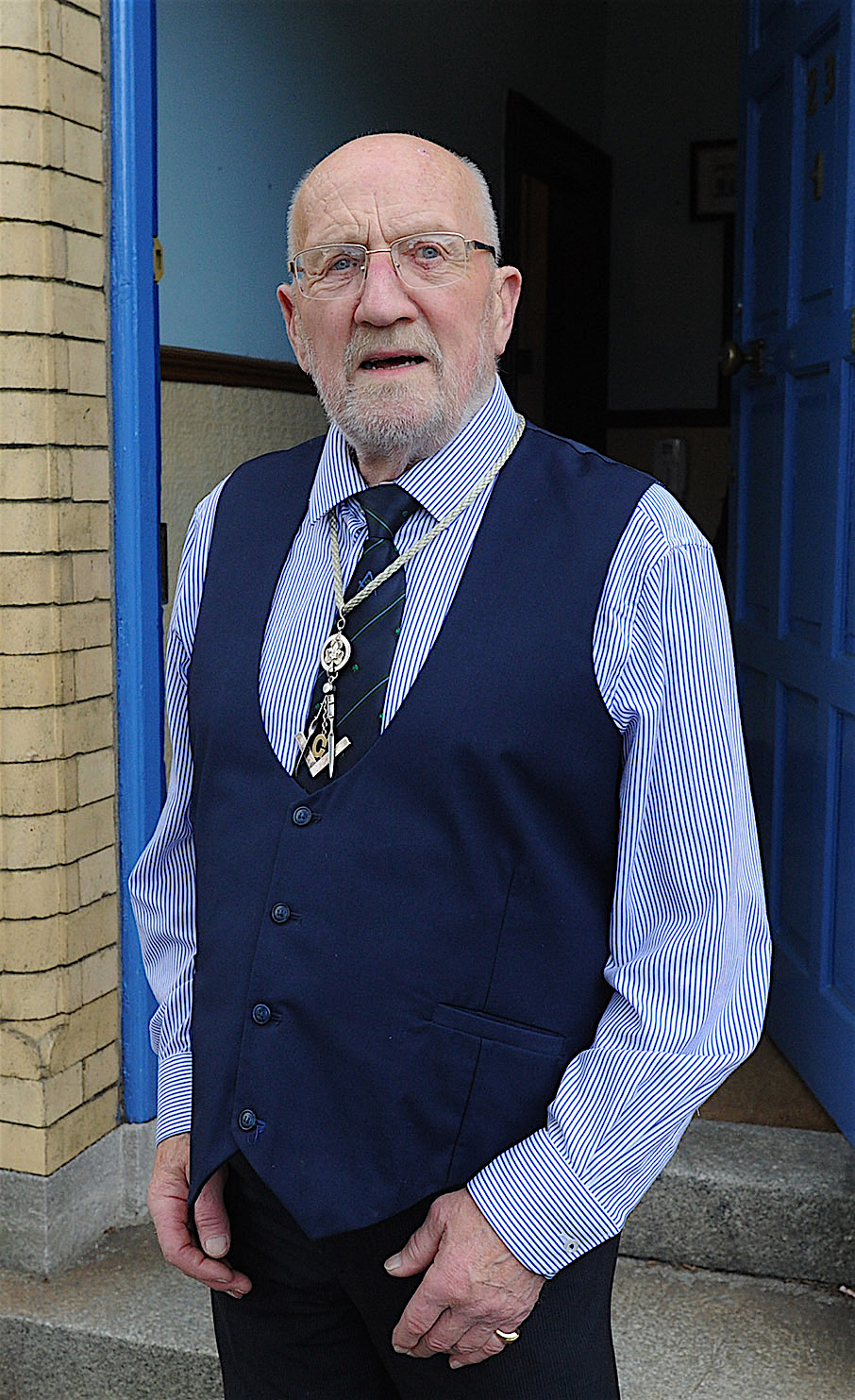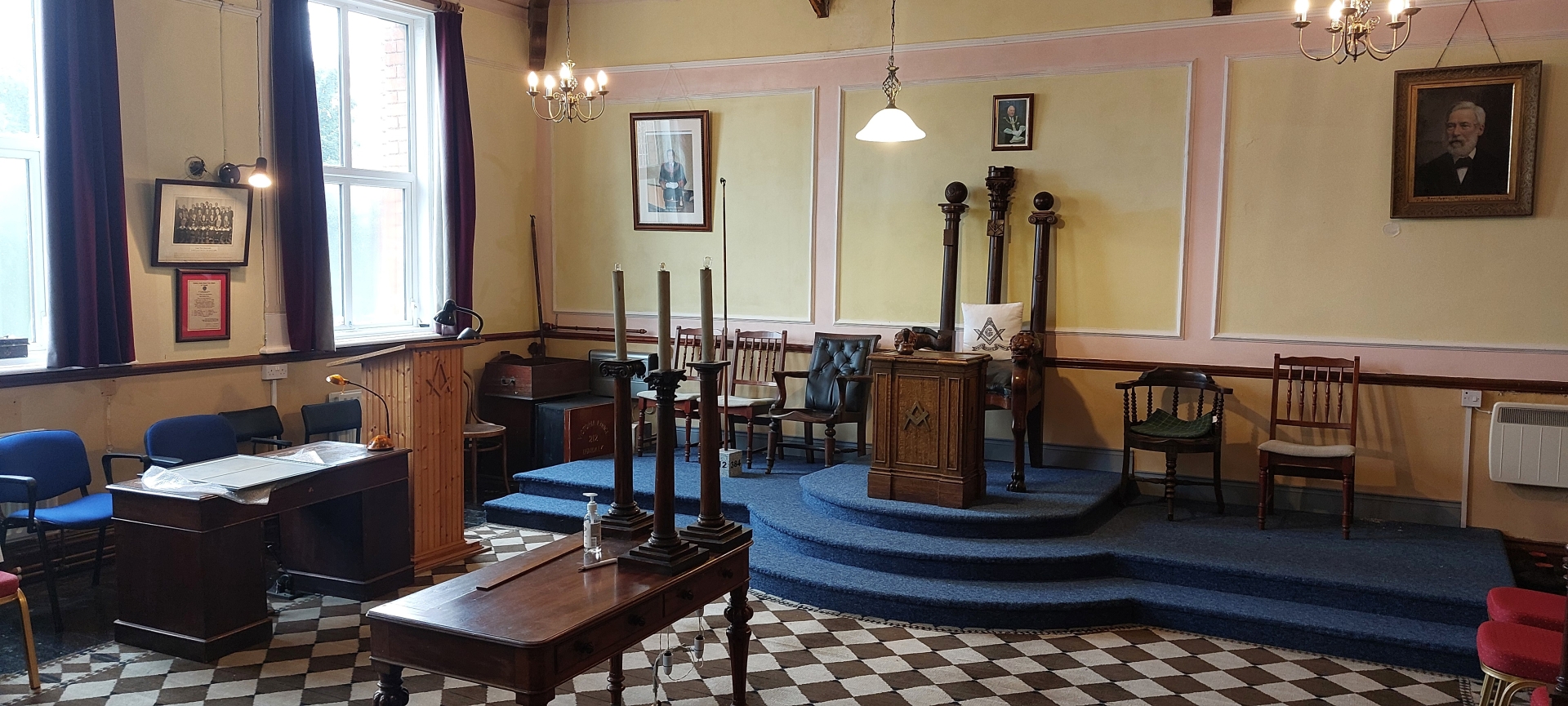
The Provincial Grand Master of of Armagh R.W. Brother Gilbert T. Irvine and Ken Ramsey Freemason's Lodge Dundalk presenting a cheque for €3000 to Ann Larkin CEO of Women's Aid. Pic: Arthur Kinahan
Freemasonry is often shrouded in mystery, and its members are typically seen as enigmatic figures within society. To coincide with the Dundalk Freemason’s cheque presentation of €3000 to the local Women’s Aid, the Democrat chatted to long standing member Ken Ramsey to shed some light on the Freemasons’ presence in Dundalk.
The discussion delved into the Freemasons’ history, their values, and their charitable endeavours in Dundalk and beyond.
“Masons promote free thinking,” Ken begins, speaking in the ‘Sherry Room’ of the Freemason’s Hall on Jocelyn Street.
“To be a member of the Masonic Order, you do have to believe in a supreme being. Now, you’re not asked about any particular Supreme Being. You can be a Muslim, you can be a Jew, you can be whatever, [and that’s because] you take oaths. If you take an oath, you have to take an oath on something,” he explains.
In Ireland at least, the group are seen as a protestant organisation, but Ken says this is a misconception partially due to the Catholic church’s traditional hostility to Freemasonry revealing that even Daniel O’Connell was a member before being forced to leave under threat of not receiving communion from the Bishop of Dublin.
He said that in the past it was often the case that businessmen in Dundalk would keep the fact they were a member hidden for fear of losing business.

Ken Ramsey outside the Freemason's Hall on Jocelyn Street. Pic: Arthur Kinahan
Ken is eager to dispel the idea that it is only Protestants that can be Freemasons and notes that over the years, Freemasonry has become more inclusive, with many Catholic members joining the ranks, reflecting the changing societal attitudes and the Good Friday Agreement’s influence on openness and reconciliation.
Discussing the Dundalk branches, Ken says, “The position here in Ireland is that it would have been predominantly Protestant. But now, we’re predominantly Catholic. I would say 75% are Catholic.”
The Freemasons trace their origins back to the times of Solomon’s Temple, predating Christ. Ken elaborates, “We like to think that we go way back to the building of Solomon’s Temple, just before Christ. A freemason was a stonemason who was free to travel anywhere for work.”
This distinction allowed them to travel freely and find work wherever their skills were needed, unlike serfs or peasants who were tied to their land.
Over time, these skilled craftsmen formed guilds, ensuring their members maintained high standards of craftsmanship and integrity.
Ken explains the importance of these guilds: “You had to prove that you were what you were to do your work.” From this came the various Mason’s handshakes to allow Masons to identify each other when searching for work/workers.
As construction projects like cathedrals grew in complexity, the status of masons elevated. Leading citizens began to join these guilds as honorary members, evolving into what is now known as speculative Masons—those who engage in Freemasonry for its moral and philosophical teachings rather than practical stonemasonry.

Inside the Freemason's Lodge on Jocelyn Street
Freemasonry has a long history in Dundalk, with the earliest lodge “Lodge 222” dating back to 1751. The Masonic Lodge on Jocelyn Street was built in 1888 and donated by Malcolm Murray of the Dundalk Distillery. Today three branches still operate in Dundalk.
Becoming a member of the Freemasons is typically facilitated by knowing an existing member who can vouch for the applicant. Ken explains, “If you happen to know a guy who’s a Mason, you say here what’s the craic there?”
Read Next: WuXi in Dundalk gets go ahead for 80 metre wind turbine
Once an individual’s name is put forward, a vetting process ensures they align with the organisation’s values.
Membership is open to men over the age of 25, and while it may seem like an “old boys’ club,” there is a growing number of younger members eager to embrace the fraternity’s ideals.
Ken acknowledges this shift, stating, “You can join after 25. Now we have quite a few younger men in there because it’s become more open. They seem to enjoy it.”
The hierarchy within Freemasonry is structured with a grandmaster at the top overseeing the entire organisation within Ireland. Each province has its own provincial grandmaster, who manages the lodges within their jurisdiction.
Ken explains, “The grandmaster is the grandmaster of the entire Masonic Order in Ireland, 32 counties. He would be elected for life. Sometimes they die in office, sometimes they say they’ve had enough.”
Freemason meetings are characterised by elaborate rituals and ceremonies, often rooted in historical practices. These rituals include opening and closing the lodge, which involves prayers and traditional procedures.
Ken elaborates, “Our meetings are pretty much run like a lot of other meetings, in so much as that you have a chair, you have secretary of minutes, you have businesses to discuss. Mainly the businesses will be charitable, how to raise money and things like that.”
One intriguing aspect Ken mentions is the voting process within the lodge, where members use black or white balls to vote on new applicants—a practice that gave rise to the term “black balled.”
He explains, “Each person has a private vote, and it’s done with balls actually, black or white. If the vote is clear, the applicant is accepted. If there’s even one black ball, the applicant is rejected.”
In modern times, Freemasonry is primarily a benevolent institution that collects and distributes funds for various charitable causes, as well as looking after its own members and their extended families in times of hardship.
“If a brethren was in any way distressed and there was any way we could help, we would help,” Ken explains.
“If he became deceased, his wife would be checked on. There’s different grants and different funds that she can apply to.
“Because at one stage it becomes means tested, but there is in between, we just give money, for example at Christmas we’ll give a present to the widow, it’s a card and it’s a few bob maybe to fill the tank or something like that.”
Having previously donated money to SOSAD, this year the Masons have donated €3,000 to Women’s aid at an evening held in the Mason’s Hall on Jocelyn Street last Friday, continuing a tradition of fellowship and charity that goes back over nearly three centuries in Dundalk.
Subscribe or register today to discover more from DonegalLive.ie
Buy the e-paper of the Donegal Democrat, Donegal People's Press, Donegal Post and Inish Times here for instant access to Donegal's premier news titles.
Keep up with the latest news from Donegal with our daily newsletter featuring the most important stories of the day delivered to your inbox every evening at 5pm.